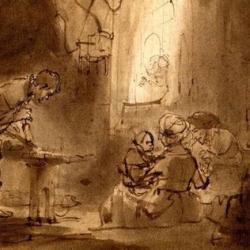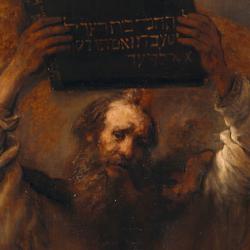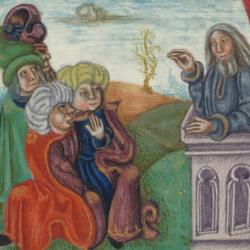Most studies of the divine warrior theme in the Old Testament are poetic or comparative. Charlie Trimm argues in “YHWH Fights for Them!” that these studies are too limited; brief poems need the enrichment and complexity of longer narrative treatments. His thorough, workmanlike monograph examines the theme in Exodus 1-15. That passage ends with one of the great divine warrior poems of the Bible, the Song of the Sea, but Trimm shows how that poem is the climax of a long narrative of Yahweh’s war.
He isolates divine warrior passages partly by looking for military terminology; even when Yahweh is not identified as a “mighty man” (gibbor) he might be carrying on a war by “striking” the Egyptians. Exodus 1-14 reveals that Yahweh uses the weapons of nature to carry on his war against Pharaoh, and he looks at the “psychological” effects of the divine warrior, especially the panic he strikes in his enemies.
After setting out the main parameters of the motif, he runs through the narrative several times, highlighting in turn various “expansions” of the theme – a narrative expansion that gives the grounds for Yahweh’s war and shows how Yahweh separates Pharaoh from various members of his court; a “martial” expansion that examines the full range of cosmic weapons and psychological effects and includes the use of cosmic enemies against Egypt; a relational expansion that focuses on the complex relationship between Yahweh and Israel. Trimm’s final chapter gives an in-depth study of the controverted “hardening” of Pharaoh’s heart, within the context of the divine warrior theme.
Two of his detailed arguments illustrate how the divine warrior motif runs through the exodus arrative. Putting the divine warrior motif in the context of the exodus narrative demonstrates that Yahweh’s is a just war. Trimm runs through the appearances of Egypt in Genesis, showing that it is depicted positively in the main. This climaxes with the offer of the land of Goshen to Jacob and his family; Trimm sees in this a sign of Yahweh’s intention to bless nations through Israel (84). This generosity is in the background when Exodus begins, and we see Pharaoh and indeed all Egypt rejecting Yahweh and reneging on the gift of land: “In reply to the provocations, YHWH declared war on Egypt. His casus belli against Egypt was not xenophobic, but Egypt’s willful rejection of YHWH and the oppression of his people Israel. Pharaoh’s hubris brought the wrath of the divine warrior on himself (95).
Later in the book, Trimm notes that “YHWH not only used traditional weapons employed by the divine warriors, but he also usurped weapons associated with cosmic enemies to employ them against Pharaoh. It might even be said that he took on the role of chaos/Yam/Mot/Tiamat/ serpent in the theomachy myths, bringing chaos to Egypt and challenging Pharaoh to restore order to Egypt like Baal/Marduk/Seth.” If this is right, it must have dumbfounded the Egyptians who “realized that they faced a god who not only could control cosmic enemies but could also employ them as a weapon against his enemies” (172).














